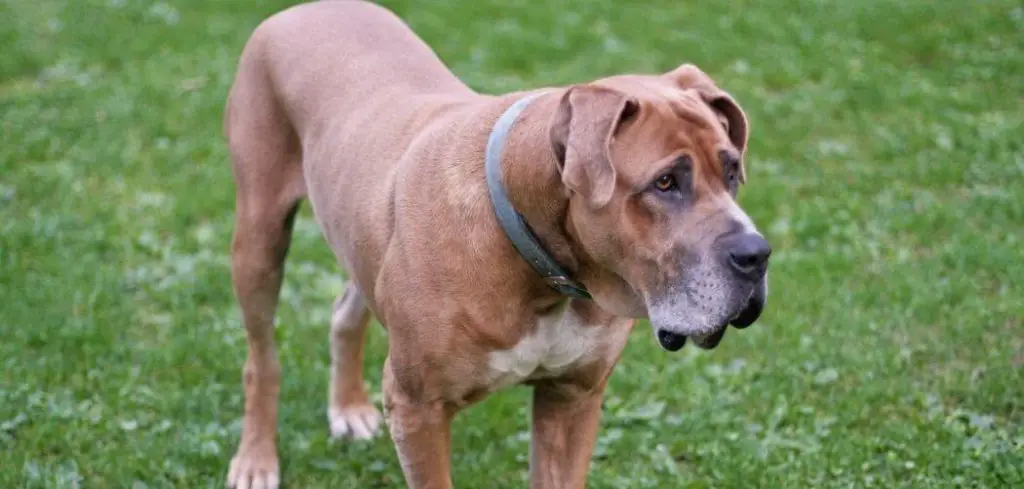Excessive panting combined with grass eating in dogs can be alarming for pet owners, especially when these behaviors appear suddenly or persistently.
We outline the common causes of a dog excessively panting and eating grass, what you can do at home, and when to seek veterinary help.
Dog Excessive Panting and Eating Grass — Why It Happens
When your dog is panting more than usual and eating grass, it often points to physical discomfort, nausea, anxiety, or overheating. Some dogs instinctively eat grass to soothe an upset stomach, while excessive panting can signal anything from heat exhaustion to respiratory distress.
In other cases, both symptoms may be linked to emotional stress, internal pain, or systemic illness such as Cushing’s disease or GI upset.

Dog Excessive Panting and Eating Grass: Common Causes
Heatstroke or Overheating
Heatstroke is one of the most urgent causes of excessive panting. Dogs regulate body temperature by panting, and when they become too hot—especially during warm weather or vigorous activity—their panting increases rapidly.
A dog that feels overheated might also start eating grass in an attempt to vomit or cool down, especially if they feel nauseous from the heat.
Other signs may include drooling, red gums, vomiting, weakness, or collapse.
This is a medical emergency, and you should cool your dog immediately and seek urgent veterinary care.
Read more: Dog Panting Excessively (Here’s why)
Gastrointestinal Upset
When dogs feel nauseated or have mild stomach upset, they often turn to grass-eating as a natural remedy.
Panting may accompany this behavior due to abdominal discomfort, bloating, or internal pain.
Common causes of GI upset include dietary indiscretion (eating garbage or spoiled food), sudden food changes, parasites, or mild toxin ingestion.
While some cases resolve on their own, others may require deworming, bland diet support, or diagnostics to rule out serious causes.
Anxiety or Stress
Panting is a classic sign of stress in dogs. Dogs may pant excessively when experiencing anxiety due to loud noises, separation, travel, or unfamiliar environments.
Some anxious dogs also eat grass compulsively as a coping mechanism.
You may notice pacing, whining, trembling, or hiding behaviors alongside these symptoms.
In these cases, stress reduction techniques, calming supplements, and training can help, but chronic anxiety may require veterinary behavior support.
Nausea or Indigestion
Nausea can cause both panting and grass eating. While sometimes overlapping with GI upset, nausea can also result from liver disease, motion sickness, pancreatitis, or certain medications.
Dogs who are nauseous may drool, lick their lips, avoid food, or act restless.
Panting often reflects internal discomfort, and the act of eating grass may be their attempt to induce vomiting.
Persistent nausea should always be evaluated by a veterinarian.
Cushing’s Disease
Cushing’s disease (hyperadrenocorticism) is a hormonal condition that causes excessive cortisol production.
Affected dogs commonly exhibit excessive panting, increased thirst and urination, a pot-bellied appearance, and sometimes unusual behaviors such as grass eating if nausea or stress are present.
This condition typically affects middle-aged to older dogs and requires diagnostic blood tests and imaging.
Treatment often includes lifelong medication to control hormone levels.
Respiratory or Cardiac Issues
When a dog’s heart or lungs are compromised, panting can become pronounced—even at rest.
Dogs struggling to get enough oxygen may pant to compensate, and in distress, might eat grass if they feel unwell or panicked.
Conditions like congestive heart failure, tracheal collapse, or lung disease can all present this way.
If panting is paired with coughing, weakness, or blue-tinged gums, urgent vet care is essential.
What to Do If Your Dog Is Panting Excessively and Eating Grass
First, assess the situation calmly. If your dog just came in from the heat or exercise, offer water, a cool environment, and rest.
If the grass eating seems minor and there’s no vomiting or lethargy, monitor closely. Some dogs eat grass occasionally without illness.
However, if the panting is heavy, lasts more than 10–15 minutes without exertion, or seems tied to nausea or restlessness, it’s wise to contact your vet.
You can try a bland diet for a day or two (like boiled chicken and rice) if mild GI upset is suspected—but skip this if your dog is vomiting repeatedly.
Make sure your dog is up to date on parasite prevention and not exposed to lawn chemicals or toxins outdoors.
For stress-related symptoms, provide a calm environment, limit stimulation, and consider calming aids like pheromone diffusers or anxiety wraps.
When to Call or Visit Your Vet
Always call your veterinarian if excessive panting comes on suddenly or is accompanied by any of the following:
Vomiting, especially repeated or with blood
Diarrhea or abdominal bloating
Weakness or collapse
Blue, pale, or bright red gums
Persistent pacing or signs of pain
Refusal to eat or drink for more than 24 hours
Even if the symptoms seem mild, if they persist for more than a day or worsen, a full veterinary exam is warranted. Early intervention can prevent complications from heatstroke, heart issues, or GI disorders.
Read more: Dog Panting and Licking Lips Excessively (Here’s why)
Key Takeaway
When a dog is panting excessively and eating grass, it’s a clear sign something’s wrong—whether it’s physical discomfort, heat stress, or underlying illness.
Stay calm, assess your dog’s overall condition, and act quickly if other symptoms develop. Offering rest, hydration, and a stress-free environment may help in mild cases.
When in doubt, always consult your veterinarian to rule out serious issues and ensure your dog gets the care they need.
